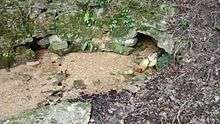Seven Springs, Gloucestershire
| Seven Springs | |
 Seven Springs |
|
 Seven Springs |
|
| Civil parish | Coberley |
|---|---|
| District | Cotswold[1] |
| Shire county | Gloucestershire |
| Region | South West |
| Country | England |
| Sovereign state | United Kingdom |
| Post town | Cheltenham |
| Postcode district | GL53 |
| Dialling code | 01242 |
| Police | Gloucestershire |
| Fire | Gloucestershire |
| Ambulance | South Western |
| EU Parliament | South West England |
|
|
Coordinates: 51°51′06″N 2°02′52″W / 51.8516°N 2.0479°W
Seven Springs is a hamlet in the parish of Coberley in the Cotswold District of Gloucestershire in England, 4 miles (6.4 km) south of Cheltenham. Located at the intersection of the A435 and the A436 roads, it is the source of the River Churn, which flows south across the Cotswolds through Cirencester and joins the River Thames near Cricklade.
Source of the Thames
Seven Springs features in the long-running argument over the true source of the River Thames.[2]


Two plaques at the site read "Hic tuus o Tamesine Pater septemceminus fons" ("Here, O Father Thames, is your sevenfold spring").[3]
The claim is based on the fact that Seven Springs is further from the mouth of the Thames than the conventional source at Thames Head near Kemble.
In 2012 Coberley Parish Council posted a notice at the site arguing that Seven Springs "is certainly one of the sources of the River Thames and is held by many to be the ultimate source". The notice adds that the site is the source of the River Churn, which flows into the Thames at Cricklade, and as its location is furthest from the mouth of the Thames, it adds some 14 miles to the length of the river flow. Furthermore, the springs at the site flow throughout the year, whereas those at the official source of Thames Head are only seasonal. "The Churn/Thames River may therefore be regarded as the longest natural river flow in the United Kingdom, beating its nearest rival, the River Severn by some 9 miles". Others have argued that the 29 miles of the River Churn would add 14 miles (23 km) to the Thames, making it 229 miles (369 km) long, 9 miles (14 km) longer than the Severn, at 220 miles (350 km) considered the longest river in England and Wales, and also longer than the River Shannon (224 miles/360.5 km), the longest river in the British Isles.[4][5]
The stream from Seven Springs is, however, joined at Coberley by a longer tributary which could claim to add further to the length of the Thames, with its source in the grounds of the National Star College at Ullenwood.
References
- ↑ "Neighbourhood Statistics: Full dataset view: Area selected: Cotswold (Non-Metropolitan District)". Office for National Statistics. Retrieved 21 January 2010.
- ↑ Philips, J. (1871). Geology of Oxford and Valley of the Thames. Oxford: Clarendon Press. p. 29.
- ↑ Winn, Christopher (2010). I Never Knew That about the Thames. London: Ebury Press. p. 11.
- ↑ Bailey, David (15 May 2012). "Could the River Thames be longer than the River Severn?". BBC News, Gloucestershire. Retrieved 6 August 2016.
- ↑ Hart, Dorothy (9 May 2004). "Seven Springs and the Churn". The-river-thames.co.uk. Retrieved 17 May 2010.
External links
| Wikimedia Commons has media related to Seven Springs. |
| Wikimedia Commons has media related to Coberley. |
- Location map (Ordnance Survey)
- GENUKI: Coberley, Gloucestershire - UK genealogy page
- Coberly/Cubberley/Cobley/Cobleigh DNA Project